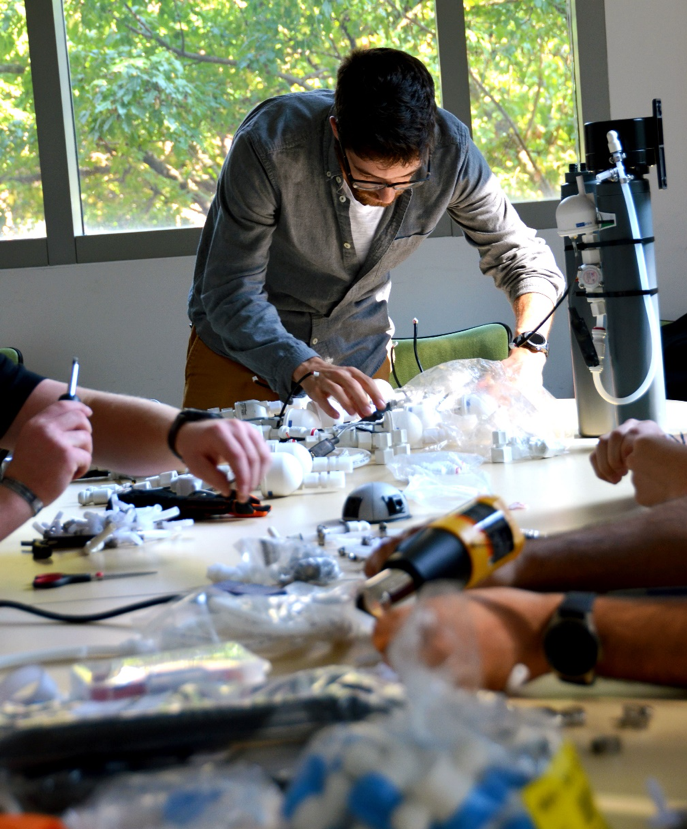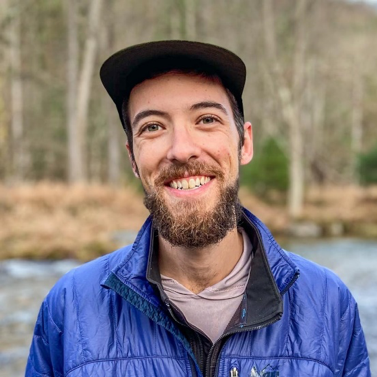Riley Mulhern is a Doctoral Candidate in the Department of Environmental Science and Engineering at UNC-Chapel Hill. Before coming to UNC he worked as a technical water quality adviser for a Bolivian environmental justice nonprofit addressing issues of mining contamination in rural indigenous communities in Oruro, Bolivia. He is from Denver, Colorado.
Testing Private Wells in Robeson County
“I was scared for my kids to drink this water,” Josephine* told me, as she yelled at them to stop messing around in the other room. We were sitting chatting about her experience in a recent study on private well water, conducted through the Department of Environmental Science & Engineering at UNC.
Josephine and her family rely on a private well in Robeson County, North Carolina. Living in an area surrounded by a municipal landfill, several large industrial hog farms, and a major chemical manufacturer, she had good reason to be skeptical of her well water.
When we tested it, we found elevated levels of some per- and polyfluoroalkyl substances, or PFAS. Recent research has shown that these chemicals, which have a range of potential health effects, are dispersed through the air from the nearby chemical plant and deposited onto the ground; they then slowly seep into people’s wells.

We also found high levels of lead from the acidic groundwater eating away at the pipes and faucet. Children on private well water in North Carolina have been shown to be at higher risk of lead poisoning through drinking water than children on city water, so immediate solutions are needed for private wells.
Identifying Solutions
By participating in the study, Josephine and 13 other well owners in Robeson County and four well owners in Chapel Hill each received a water filter and monthly water quality tests to evaluate the filters for removing lead and PFASs. The study aimed to better understand how effective water filters are for private well water so that local health departments, state health agencies, and other groups that deliver technical support to private well users can make better recommendations for people like Josephine.
Specifically, we tested under-sink, point-of-use (POU) water filters, which treat the water at a single faucet and are installed underneath the sink. Most under-sink, POU filters are certified to remove certain chemical contaminants from municipally-treated tap water, but very little research has been done to know if they are effective for removing lead or PFAS from private well water. City water is highly treated before it reaches the tap, but private well water quality can vary widely, which could affect how the filters perform.
Given the lack of research, many well users who are concerned about their water aren’t sure what to do and often end up relying on bottled water instead. “I had to go and buy cases of water,” Josephine explained. “A lot of time I would run out of water and I had to go buy more.”
But if POU filters work for private well water, they could be a lot less expensive than buying bottled water. For example, the filter we tested is rated to treat 784 gallons over six months and costs $70 per cartridge, which works out to be about 9 cents per gallon of clean water. Bottled water, on the other hand, costs between 50 cents and $8 per gallon.
The results of the study are also promising. After almost eight months of sampling and water quality analyses conducted at UNC, RTI International, and NC State, the 18 filters tested reduced lead concentrations by 98% on average and removed 97-99% of PFASs.

The lead results, recently published in the journal Water, showed that the filters effectively reduced lead levels to less than 1 µg/L, which is the maximum amount of lead in drinking water recommended by the American Academy of Pediatrics, for the entire recommended lifetime of the cartridge. We also found that well users still need to be careful with under-sink filters because after the water goes through the filter it can sometimes be re-contaminated with a small amount of lead leaching from the faucet fixture if the water is left sitting for several hours. Running the water for one to two minutes first thing in the morning or after it has been left unused for hours at a time is a good practice to make sure only clean, filtered water is coming out of the tap.
PFAS were also almost entirely removed by the filter for the whole study. PFAS can be difficult to remove by large-scale processes at drinking water utilities, but they were effectively removed by POU filters for the entire duration of the study. The results, currently in preparation for peer-review, provide increased confidence in POU filters for people who live near potential PFAS sources.
In three of the 18 households, the filters clogged after only 2-3 months of use, meaning that some well owners might need to install a low-cost prefilter to remove sediment and particles that block the filter’s pores. Overall, however, the results are encouraging for well users looking for an easy, DIY solution for lead or PFAS in well water and provide evidence for the broader use of POU filters as a public health intervention. “Once you came and installed the filter,” Josephine told me, “I didn’t have no problem then, I felt safe.”
Advice for Installing a Water Filter
Are you on a well and think you might want to install a filter? Here are some things you should know.
What filter should I buy?
It depends on what is in your water. It’s best to get a water test first to know what you need to treat for. Contact your local health department about testing for common contaminants like lead. PFAS testing is expensive but can be obtained from private laboratories like SimpleLab and WaterCheck.
If you know you have a problem with lead or PFASs specifically, we tested the AO-MF-ADV Advanced Clean Water Filter by A.O. Smith, available at Lowes. This filter is certified according to standards set by the National Sanitation Foundation (NSF) and American National Standards Institute (ANSI) for removal of lead and PFASs. When purchasing a filter for lead, look for the certification NSF/ANSI 53 and NSF/ANSI 42. The U.S. EPA has prepared a helpful factsheet for identifying authentic product certifications for lead. For PFASs, look for the certification NSF P473.
Make sure the product was tested by a trusted, third-party agency, like NSF International or the International Association of Plumbing and Mechanical Officials (IAPMO). Under-sink filters are also likely to be more effective and last longer than pitcher filters.
How often should I change the filter?
Follow the manufacturer recommendation. The filter we tested was protective for the entire recommended lifetime of six months. Make sure to set reminders and change it out on time because switching the cartridge regularly is the best way to ensure you are always getting clean water from your tap.
What about bacteria?
Most under-sink filters use some sort of activated carbon cartridge which is not protective against bacteria and viruses in well water. Ideally, there should not be any harmful bacteria or viruses in your well water. Make sure to test at least annually for total and fecal coliform bacteria and make sure your well is properly sealed and maintained as leaks and cracks at the surface are the most common way for potential pathogens to enter your well. More information on maintaining your well, including how to perform a visual inspection and how to contact a well water contractor if necessary, can be found here.
Notes: This study was funded by the North Carolina Policy Collaboratory at UNC Chapel Hill. No funding was received by the filter manufacturer A.O. Smith for this work.
*Name changed for privacy.


